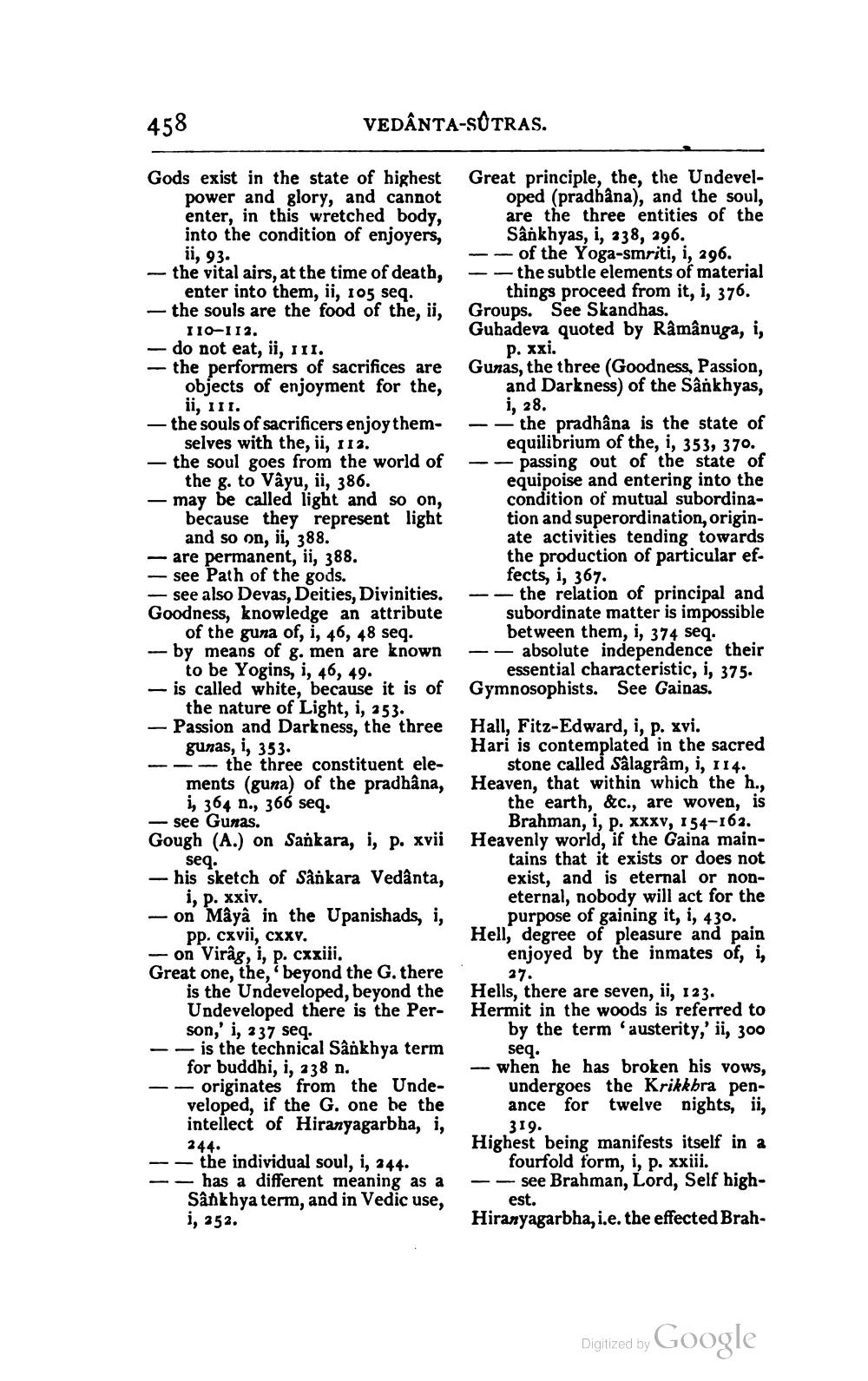________________
458
VEDÂNTA-SOTRAS.
Gods exist in the state of highest
power and glory, and cannot enter, in this wretched body, into the condition of enjoyers,
11, 93.
Great principle, the, the Undevel
oped (pradbâna), and the soul, are the three entities of the
Sankhyas, i, 238, 296. -- of the Yoga-smriti, i, 296. -- the subtle elements of material
things proceed from it, i, 376. Groups. See Skandhas. Guhadeva quoted by Râmânuga, i,
p. xxi. Gunas, the three (Goodness, Passion,
and Darkness) of the Sankhyas,
i, 28. - - the pradhana is the state of
equilibrium of the, i, 353, 370. - passing out of the state of equipoise and entering into the condition of mutual subordination and superordination, originate activities tending towards the production of particular ef
fects, i, 367. -- the relation of principal and
subordinate matter is impossible
between them, i, 374 seq. - - absolute independence their
essential characteristic, i, 375. Gymnosophists. See Gainas.
the vital airs, at the time of death,
enter into them, ii, 105 seq. - the souls are the food of the, ii,
110-112. - do not eat, ii, 111. - the performers of sacrifices are
objects of enjoyment for the,
ii, 111. - the souls of sacrificers enjoy them-
selves with the, ii, 112. - the soul goes from the world of
the g. to Vayu, ii, 386. - may be called light and so on,
because they represent light
and so on, ii, 388. - are permanent, ii, 388. - see Path of the gods. - see also Devas, Deities, Divinities. Goodness, knowledge an attribute
of the guna of, i, 46, 48 seq. - by means of g. men are known
to be Yogins, i, 46, 49. - is called white, because it is of
the nature of Light, i, 253. - Passion and Darkness, the three
gunas, i, 353 - -- the three constituent ele
ments (guna) of the pradhâna,
i, 364 n., 366 seq. - see Gunas. Gough (A.) on Sankara, i, p. xvii
seg. - his sketch of Sankara Vedanta,
i, p. xxiv. - on Mâyâ in the Upanishads, i,
pp. cxvii, cxxv. - on Virág, i, p. cxxiii. Great one, the, beyond the G. there
is the Undeveloped, beyond the Undeveloped there is the Per- son,'i, 237 seq. - is the technical Sankhya term
for buddhi, i, 238 n. -- originates from the Unde
veloped, if the G. one be the intellect of Hiranyagarbha, i,
244. - - the individual soul, i, 244. -- has a different meaning as a
Sankhya term, and in Vedic use, i, 252.
Hall, Fitz-Edward, i, p. xvi. Hari is contemplated in the sacred
stone called Salagrâm, i, 114. Heaven, that within which the h.,
the earth, &c., are woven, is
Brahman, i, p. xxxv, 154-162. Heavenly world, if the Gaina main
tains that it exists or does not exist, and is eternal or noneternal, nobody will act for the
purpose of gaining it, i, 430. Hell, degree of pleasure and pain
enjoyed by the inmates of, i,
27.
Hells, there are seven, ii, 123. Hermit in the woods is referred to
by the term 'austerity,' ii, 300
seg. when he has broken his vows,
undergoes the Krikkbra pen
ance for twelve nights, ii, Highest being manifests itself in a
fourfold form, i, p. xxiii. --- see Brahman, Lord, Self high
est. Hiranyagarbha, i.e. the effected Brah
319.
Digized by Google




